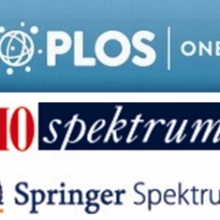Absence of the yeast Hsp31 chaperones perturbs cytoplasmic protein quality control
The Saccharomyces cerevisiae heat shock proteins Hsp31, Hsp32, Hsp33 and Hsp34 belong to the DJ-1/ThiJ/PfpI superfamily which includes the human protein DJ-1 (PARK7)as the most prominent member. Mutations in the DJ-1 gene are directly linked to autosomal recessive, early-onset Parkinson’s disease. DJ-1 acts as an oxidative stress-induced chaperone preventing aggregation and fibrillation of alpha-synuclein, a critical factor in the development of the disease. In a paper in PLOSone (Amm et al., 2015), we use an aggregation-prone misfolded cytoplasmic protein as a model substrate for protein stability and folding and show by in vivo assays in Saccharomyces cerevisiae an influence of the Hsp31 chaperone family on the steady state level of this substrate. In contrast to the ubiquitin ligase of the N-end rule pathway Ubr1, which is known to be prominently involved in the degradation process of misfolded cytoplasmic proteins, the absence of the Hsp31 chaperone family does not impair the degradation of newly synthesized misfolded substrate. Also degradation of substrates with strong affinity to Ubr1 like those containing the type 1 N-degron arginine is not affected by the absence of the Hsp31chaperone family. Epistasis analysis indicates that one function of the Hsp31 chaperone family resides in a pathway overlapping with the Ubr1 dependent degradation of misfolded cytoplasmic proteins. This pathway gains relevance in late growth phase under conditions of nutrient limitation. Additionally, the Hsp31 chaperones seem to be important for maintaining the cellular Ssa Hsp70 activity which is important for Ubr1-dependent degradation.
Another publication in BIOspektrum (Menssen & Wolf, 2015) is a review on the regulation of cellular functions as well as the protein quality control by the ubiquitin-proteasome system. It highlights the diverse essential function of the ubiquitin-proteasome system in the cellular regulation and protein quality control based on the Stuttgart works of the Wolf Laboratory.


